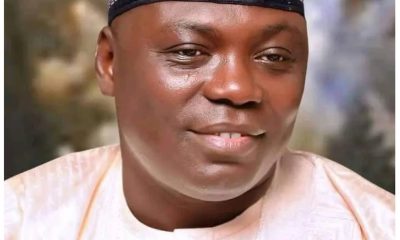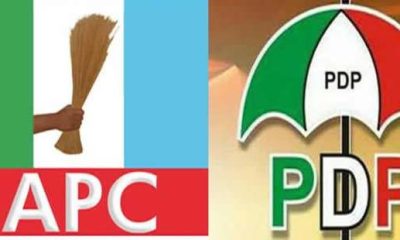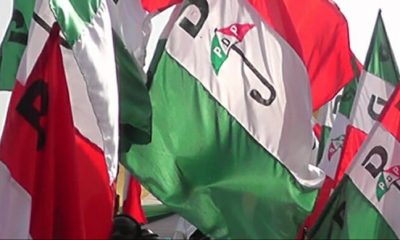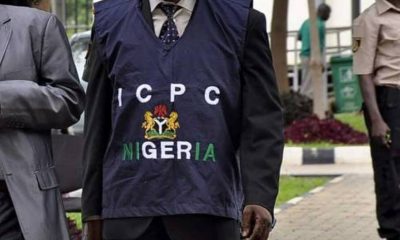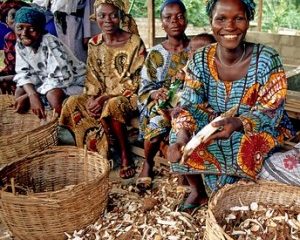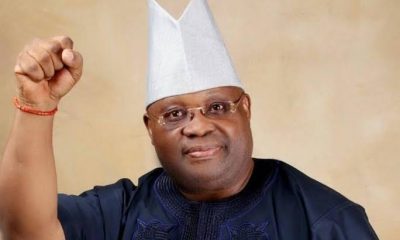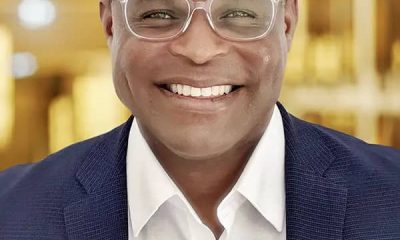OPINION
Open Letter to APC Delegates
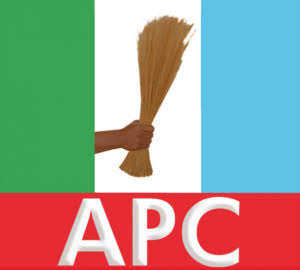
By Seun Bisuga
Dear APC Delegates,
The year 2023 is almost upon us and the future of Nigeria hangs in the balance. It is true that the voters will determine who becomes President but long before that, the party delegates would have predetermined who becomes President.
This letter is a plea to all APC delegates as the party prepares for its presidential primaries on May 31.
I am writing you to ask that you put country first and consider the future of over 200 million Nigerians, many of whom will be grateful for the wise decisions you will make on that historic night.
I think you will agree with me that we need someone who can finish the good works of President Muhammadu Buhari especially in the area of infrastructure, roads, rail lines, financial autonomy for judiciary and legislature, among many others. We indeed need someone who won’t discard them or have to learn afresh.
1. The first issue I think you might want to consider is Tolerance. Many people say that Nigeria needs a unifier, someone that can make all citizens know that they have an equal stake in the country. A leader, not a ruler, someone who speaks the language that everyone understands and who will connect with all tribes, gender, ethnicity and beliefs. Since declaration for 2023 begun, we have found that some aspirants are intolerant. They simply cannot accept the decisions or actions of others and many Nigerians believe this is a wrong signal. If some persons cannot agree with other contestants who in total are less than 20, how will they behave when 100 million people disagree with them? Even the delegates will be impacted by this intolerance if they do not make a careful, well-thought decision today.
2. In a message, Pastor Paul Adefarasin mentioned three things the incoming Nigerian President must be able to do/deliver. I agree with him to some extent. First he spoke about the Rule of Law. It is often argued that it takes a man who understands ‘the law’ to be able to ensure adherence to the rule of law. I think we can look back carefully at each candidate’s past to determine who will uphold the rule of law and who wouldn’t.
3. Mr Adefarasin also spoke about presidential candidate who can attract foreign direct investment. He reasoned that the country needed someone that investors can listen to and believe. Someone who had experience attracting big tech, oil companies, human capital development and other investors to Nigeria.
4. And lastly, Mr Adefarasin valued a candidate that can speak English. We need a presidential candidate that can stand shoulder to shoulder with any foreign leader. He used the words eloquent, yes, a leader who is eloquent and who you know will make Nigeria proud always on the global stage.
5. I will delve into the recommendations of a former Head of State, Ibrahim Babangida. Even though I do not think age is a big factor, the army general does. He narrowed down his presidential candidate to not more than mid-60s. He reckoned that this person ought to be physically and mentally fit to take on the huge task ahead. For me, however, I will harp on health. Delegates please consider the health of the candidate. I understand that NDLEA wants to put them to drug tests, it is a welcomed development but beyond that we need to be sure that the candidate can withstand the physical, mental and psychological rigours the office demands.
6. The former head of state then spoke about ‘good leadership’. To quote him, “If you get a good leadership that links with the people and tries to talk with the people; not talking on top of the people, then we would be okay. I have started visualizing a good Nigerian leader. That is, a person who travels across the country and has a friend virtually everywhere he travels to and knows at least one person that he can communicate with.” Like the general, many Nigerians want a leader that mirrors them, one they can talk to, a leader they can relate to.
7. At this point, let us talk Security. This is perhaps the biggest heart-wrenching problem that most Nigerians face today. They want insecurity to end and culprits punished. They want a leader that has shown competence at this level and who has an insight into how things work at the federal level. A leader that will hit the ground running, not one that will have to learn on the job. Again on security, you will agree that we need someone who is conversant with what the problems are, someone who is ahead in the thinking process, and has committed to reconfigure the architecture where and when necessary to restore peace.
8. Then there is the Economy. We know that there are too many components of the economy and only a leader who has seen firsthand how to make these components work together can help Nigeria get to where it should be rather quickly. I agree that most of the aspirants are qualified but I ask the delegates to vote the very best. Someone who has shown capacity if empowered to rein in fiscal and monetary policies into one synergy. Someone who also understands the basic of knowledge the economy and has the endorsement of global investors.
9. Education: This is a major issue that must be given topmost consideration in voting a presidential candidate within the APC. It is common knowledge that the Buhari administration made giant strides in the regard but even more need to be done. We need a leader that know what it means to reduce out-of-school-children and bring them back to school. What about ASUU strikes? We need a leader with tact, who listens and who ca shift ground where and when necessary. We also need a leader that can help improve the standard of living and who has a plan to ensure access to healthcare.
10. Electricity, Climate Change and Job Creation is a big problem. With the poverty figures going off the roof we need a leader that can use the social safety net to reach more Nigerians and lift them out of poverty. A leader that can create jobs not handout money to Nigerians, a leader to can improve human capital development and enhance capacity.(ii) Electricity is one of the drivers of Nigeria’s economy, if we can tap into Nigeria’s capacity to use solar power and also increase infrastructure in this sector. MSMEs rely on basic infrastructure to thrive and only a leader who has close ties and understanding of how MSMEs work can relate. Generally speaking, Nigerians, all Nigerians both urban and rural need electricity.(iii)Climate Change might not be a big talking point but its already happening. Last year, we witnessed rain falling out of season and we barely witnessed Harmattan, these are pointers to what is to come. What about clean energy? What about transitional fuel?
To all delegates across Nigeria, we want a leader and not a politician. We do not want a leader that wants to influence every local government, state and national assembly election. We want someone that will lead not rule, we want someone that will be tolerant.
On our behalf, please do make the best decision, again the future of Nigeria in your hands.
Thank you.
Seun Bisuga, a public analyst and journalist writes from Lagos
OPINION
A silent Emergency: Soaring Costs of Diabetes Care Spark Alarm

By Folasade Akpan
For Mrs Schola Effiong, a 58-year-old confidential secretary in Calabar, managing diabetes in today’s economy feels like “climbing a hill that only gets steeper”.
Diagnosed in 2009, she said her monthly expenditure on insulin, tablets, laboratory tests and monitoring supplies now exceeds ₦150,000.
“You cannot stop taking the drugs, yet the cost keeps going up.
“Sometimes I do not have the money to buy some of them at the same time,” she said.
Her struggle mirrors the experiences of thousands of Nigerians at a time when experts warn that diabetes is becoming a major public health concern.
According to a 2018 national meta-analysis by Uloko et al.
, titled “Prevalence and Risk Factors for Diabetes Mellitus in Nigeria: A Systematic Review and Meta-Analysis”, Nigeria’s diabetes prevalence stands at 5.7 per cent, representing 11.2 million adults.The authors defined diabetes mellitus as a metabolic disorder of chronic hyperglycaemia caused by absolute or relative insulin deficiency and associated with disturbances in carbohydrate, protein and fat metabolism.
The study, which pooled data from numerous research works across the country, revealed wide regional disparities.
The prevalence rate was 3.0 per cent in the North-West, 5.9 per cent in the North-East, and 3.8 per cent in the North-Central, respectively.
The rates were higher in the southern part of the country: 5.5 per cent in the South-West, 4.6 per cent in the South-East, and 9.8 per cent in the South-South.
Experts say these patterns reflect changing lifestyles, rapid urbanisation and limited access to routine screening.
However, for many patients, statistics tell only a fraction of the real story.
Mr Offum Akung, a 57-year-old teacher in Cross River, said he had to ration his drugs because prices kept rising faster than his salary.
“I spend over ₦40,000 a month and still cannot buy everything on my prescription.
“I rely mostly on Glucophage now; when money allows, I add Neurovite Forte; diabetes management has become more difficult than the disease itself,” he said.
He appealed for government intervention, saying many patients were already “giving up”.
The Second Vice-President of the Diabetes Association of Nigeria, Mr Bernard Enyia, said the economic situation had pushed many Nigerians with diabetes into dangerous coping methods.
He said that he once managed his condition with about ₦70,000 monthly, but currently spends more than ₦180,000.
“Insulin has become something you pray for, while some people are sharing doses or skipping injections.
“Once you break treatment, the complications come quickly.”
Enyia, who lost his job as a health worker in 2017 due to frequent hospital visits, described the emotional toll as immense.
“It affects your finances, your social life, your marriage — everything. Many Nigerians with diabetes are quietly drowning,” he said.
Globally, concerns are also rising.
The World Health Organisation (WHO) estimates that more than 24 million adults in Africa are living with diabetes, a figure projected to rise to 60 million by 2050.
Marking World Diabetes Day 2025, WHO Regional Director for Africa, Prof. Mohamed Janabi, warned that rising obesity, lifestyle changes and weak health systems were fueling an “unprecedented wave of diabetes” across the continent.
He urged governments to prioritise access to affordable insulin, diagnostics and long-term care.
More so, pharmacists say they are witnessing the crisis firsthand.
The Senior Vice-President, Advantage Health Africa, Mr Adewale Oladigbolu, said many patients were no longer able to maintain regular medication schedules.
“People buy drugs today and skip them tomorrow because they do not have money.
“With non-adherence, they never reach therapeutic goals.”
Oladigbolu, a Fellow of the Pharmaceutical Society of Nigeria, said that locally manufactured metformin remained in high demand due to affordability, but insulin-dependent patients faced the harshest burden.
He stressed that diabetes care extended far beyond drugs.
“You need glucometers, strips, blood pressure monitors and regular tests.
“In countries where insurance work, patients do not think about the cost; in Nigeria, they pay for everything out of pocket,” he said.
He called for diabetes care to be covered under health insurance to reduce the financial burden on patients.
President of the Diabetes Association of Nigeria, Prof. Ejiofor Ugwu, described the rising cost of treatment as “a national crisis hiding in plain sight.
He said insulin, which sold for about ₦3,500 four years ago, presently costs ₦18,000 to ₦22,000 per vial.
“Test strips that were ₦2,000 now sell for ₦14,000, while glucometers have risen from ₦5,000 to over ₦25,000.
“On average, a patient now needs between ₦100,000 and ₦120,000 every month. Imagine earning ₦50,000 and being asked to spend twice that on one illness.”
He warned that between half and two-thirds of Nigerians with diabetes remain undiagnosed.
“We are seeing more kidney failure, more limb amputations, more blindness.
“These are late presentations caused by delayed or inconsistent treatment.”
Ugwu urged the Federal Government to urgently subsidise essential anti-diabetic medications and remove taxes on their importation.
“Most of these drugs are produced outside the country.
“Once you add import duties and other charges, prices become unbearable; subsidies and tax waivers could drop costs by at least 30 per cent,” he said.
He also called for expansion of the National Health Insurance Authority (NHIA) to cover a wider range of anti-diabetic medicines, glucose meters and strips — none of which are currently covered.
For many Nigerians, however, the struggle continues daily.
Across households, clinics and pharmacies, the message is the same: as Nigeria’s diabetes prevalence rises and treatment costs soar, more patients are slipping through the cracks — some silently, others painfully — while waiting for meaningful intervention.
In all, stakeholders say diabetes is a national emergency; people are dying quietly because they cannot afford medicine; hence the urgent need for relevant authorities to make anti-diabetic medications accessible and affordable.(NAN)
| ReplyReply allForwardAdd reaction |
OPINION
Is Community Parenting Still Relevant?

By Dorcas Jonah
In the Nigerian culture, extended families and communities play a crucial role in care-giving, instilling values, and supporting the development of children.
This cultural heritage of community parenting emphasises shared responsibility in raising children.
But in contemporary Nigeria, this age-long practice is facing enormous challenges due to modernisation.
In scrutinising this trend, some parents are of the view that community parenting helps in instilling morals and curbing social vices among children and youths, while others believe it is outdated.
Some parents are of the belief that their children are their responsibility; so they do not tolerate others correcting their children.
By contrast, others say that community parenting, when done with good intentions, can help raise a better society.
Mr Peterson Bangyi, a community leader in Dutse Makaranta, said that community parenting was the bedrock of raising a child.
He said the adage: “it takes a village to raise a child”, remained a powerful principle in contemporary society.
According to him, by Nigeria’s cultural norms and values, a child is owned by everyone; therefore, the grandparents, aunts, uncles, and neighbours actively contribute to raising children.
“This approach fosters a sense of belonging and ensures children grow up with diverse role models.”
Bangyi said that the extended families practiced by more communities were the backbone of parenting.
“But modernisation has taken away this practice as most families do not want people to come close to their children,’’ he said.
Mrs Monica Umeh, a mother of two, emphasising on the importance of community parenting, said that it played significant role in shaping her upbringing as a child and young adult.
Umeh advised that when correcting other people’s children, it is essential to do so with love and good intentions, without any form of bitterness.
“I am a strong advocate of community parenting as long as it is done with love and good intentions.
“I believe no parent can single-handedly raise a child without the support of others,’’ he said.
Mr Temitope Awoyemi, a lecturer, said that community parenting was crucial and could not be over-emphasised.
He said that community parenting helped society in inculcating strong moral values in children and youths, adding that modern life could be isolating for parents.
Awoyemi said that strong community support networks had been shown to lower parental stress levels and promote a more optimistic approach to raising children.
“It also ensures that a child receives guidance and correction from various adults, providing a broader, more consistent moral and social baseline that might be missed by parents who are busy with work.
“Community parenting encourages collaborative, interdisciplinary support from various community members and agencies in addressing a child’s developmental needs comprehensively.
“It focuses on prevention of long-term problems and celebrating individual strengths,’’ he said.
Awoyemi said that as the society continued to evolve, community parenting could adapt to ensure children benefitted from both cultural roots and contemporary innovations.
Mr Fortune Ubong, a cultural enthusiast, attributed the increasing crime rate in Nigeria to lack of community parenting that had extended to schools, and government institutions.
According to him, community parenting remains the foundation of every child’s moral upbringing.
“Most parents are now focused on earning a living and improving their lifestyle, in the process abandoning their primary duty of molding and guiding their children; this is where community parenting plays a greater role,” he said.
However, Mrs Joy Okezia, a businesswoman, said that given the recent developments in the country, correcting a child should be the sole responsibility of their parents.
Okezia said that she preferred to correct her children herself as she knew them better than anyone else.
She also noted that with the rising insecurity in the country, intervening to correct a child could pose a significant risk to the person.
Mrs Ijeoma Osita, a civil servant, also shared Okezia’s view, saying that a child’s behaviour was shaped by their family upbringing.
She said that if a child was not taught to love and respect others at home, an outsider would have little impact in correcting such a child.
Osita emphasised that parents should in still in their children the values of love and respect regardless of their status or background.
According to her, a child brought up with good values is less likely to misbehave well.
She cited the Holy Bible, saying, that says: “Train up a child in the way they should go, and when they are old, they will not depart from it’’.
Osita said that community parenting remained a vital aspect of Nigerian culture, promoting shared responsibility and resilience among families.
He opined that while modernisation posed challenges, blending traditional practices with modern strategies offered a promising path forward.
Observers say robust community connections are linked to better social-emotional development, academic achievement, and overall well-being for children.
They say that in modern society, amidst the digital world, economic instability, and busy work schedules, parents face pressures, making community support systems fundamental.
All in all, stakeholders are of the view that combining traditional community parenting with modern childcare – integrating technology, play-based learning, and skill acquisition – will produce well-rounded children.(NAN)
FEATURES
Victor Okoli: The Young Nigerian Tech Founder Building Digital Bridge Between Africa and America

Victor Chukwunonso Okoli, founder of Vnox Technology Inc. (USA) and Vnox Limited (Nigeria), is steadily emerging as one of the most promising new voices in global travel-tech. His mission is clear: bridge the technological gap between Africa and the United States, redefine global travel systems, and empower a new generation of skilled youths through innovation-driven opportunities.
In a statement issued in Onitsha, Anambra State, by Vnox Limited (Nigeria), the company emphasized Okoli’s growing influence as a Nigerian international graduate student contributing meaningfully to U.
S. innovation. His rising travel-technology platform, FlyVnox, currently valued at an estimated $1.7 million, is positioning itself as a competitive player in the global travel ecosystem.Okoli explained that Vnox Technology was founded to “train, empower more youths, create global employment opportunities, and drive business growth through our coming B2B portal inside the FlyVnox app.” The platform’s new B2B system aims to support travel agencies, entrepreneurs, and businesses across Africa and the diaspora—giving them access to modern tools, previously inaccessible technologies, and global opportunities.
Several young men and women are already employed under the expanding Vnox group, with more expected to join as the brand grows internationally.
Born and raised in Eastern Nigeria, Okoli’s early life exposed him to the realities and frustrations faced by international travelers and diaspora communities. After moving to the United States for graduate studies, he transformed those experiences into a bold technological vision—building systems that connect continents and create seamless mobility for users worldwide.
At the center of that vision is the FlyVnox app, a modern airline-ticketing platform built with global users in mind. Combining American engineering precision with African mobility realities, FlyVnox offers international flight search, multi-currency support, secure payments, transparent pricing, and a clean, intuitive interface.
Beyond FlyVnox, Okoli has built a growing tech ecosystem under Vnox Technology Inc., which oversees several innovative ventures, including: Vnox TravelTech Solutions LLC (FlyVnox App), VnoxPay (fintech), VnoxShop / Zyrlia (e-commerce)
VnoxID / Nexora (digital identity and smart business card solutions)
Vnox Limited (Nigeria) anchors African operations, media services, and talent development—ensuring the brand remains rooted in its home continent even as it grows globally.
Okoli’s work has broad significance for both Africa and the United States. He represents the powerful impact of immigrant entrepreneurship on global competitiveness—creating new jobs, driving innovation, strengthening U.S.–Africa commercial ties, and contributing to the development of practical, scalable technologies.
The statement concludes that Vnox Technology is a brand to watch. As FlyVnox gains international traction and the Vnox group expands its footprint, Victor Okoli stands as a symbol of a rising generation: African-born, globally minded, and building technologies that connect and serve the world.

